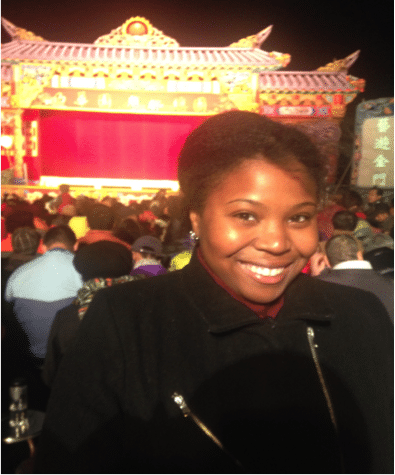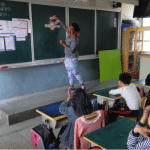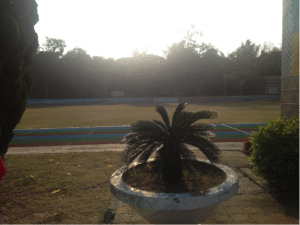 At JinNing Elementary School, there are no custodians. I arrive on my bike each morning around 8:15 to find students, from pre-school to sixth grade carrying out their daily morning cleaning chores, frolicking throughout the school yard raking leaves, mopping floors, or collecting trash. It’s funny to see the students playing in the sudsy mop water and the tiniest of the bunch carrying large barrels of trash twice their size. In Taiwanese schools, cleanliness, order, and personal responsibility are concepts taught and mastered at a very young age. School-aged children keep the school environment and their classrooms clean and tidy and have great personal hygiene routines. After class, students will sweep and mop the floors, and everyday after lunch, students and teachers alike go outside to brush their teeth. Shortly afterwards, the entire school shuts down for a 45 minute nap time (yes, even teachers get to take naps), and we wake up refreshed and ready to continue on with our school day. Nap time definitely helps with the overall Fengshui of the classroom, as students are noticeably more calm and focused afterwards.
At JinNing Elementary School, there are no custodians. I arrive on my bike each morning around 8:15 to find students, from pre-school to sixth grade carrying out their daily morning cleaning chores, frolicking throughout the school yard raking leaves, mopping floors, or collecting trash. It’s funny to see the students playing in the sudsy mop water and the tiniest of the bunch carrying large barrels of trash twice their size. In Taiwanese schools, cleanliness, order, and personal responsibility are concepts taught and mastered at a very young age. School-aged children keep the school environment and their classrooms clean and tidy and have great personal hygiene routines. After class, students will sweep and mop the floors, and everyday after lunch, students and teachers alike go outside to brush their teeth. Shortly afterwards, the entire school shuts down for a 45 minute nap time (yes, even teachers get to take naps), and we wake up refreshed and ready to continue on with our school day. Nap time definitely helps with the overall Fengshui of the classroom, as students are noticeably more calm and focused afterwards.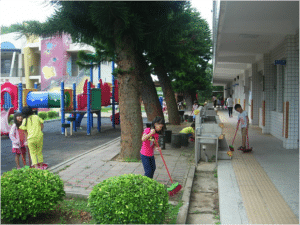
This may be one big difference between Taiwanese and American schools, but there are also many similarities. Students participate in so many extracurricular activities that there are almost too many for the small amount of students we have! My entire elementary school is made up of 98 students, grades 2nd -6th, yet students have a plethora of activities to choose from. For instance, there’s swim team, ping pong team, Chinese yoyo, traditional drum club, Reader’s Theatre, calligraphy, T-ball, Track & field, Badminton and the list goes on! The students are spread very thin among these activities and sometimes they miss class to attend their competitions. Fun Fact: My school’s Badminton team is ranked No. 2 in the entire country of Taiwan! We also won the Kinmen County Badminton Championships this past November! Go JinNing!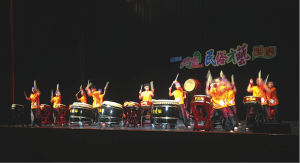
After school, I enjoy branching out in my local community. For a while, I was taking private guitar lessons (and yes, all in Taiwanese—hardest thing I’ve ever done) but now, I am helping facilitate workshops on professional writing for Kinmen University. I really enjoy writing, so facilitating writing workshops are one way to get engaged with the community and do something that I love. For such a small island (we are an island off of the main island of Taiwan), there are so many things to do! For instance, just yesterday on December 17th , I went to see a traditional Taiwanese opera. The Opera was outside—which is how it was done back in the day—and it was freezing cold! However, the Chinese/ Taiwanese Opera is truly a one of a kind experience and is unlike any other opera in the world; I couldn’t pass up the opportunity. From the costumes, to the dialect that the actors speak, to the drama and suspense of it all, attending one, even in below 40 degree weather is definitely worth it.
[fusion_builder_container hundred_percent=”yes” overflow=”visible”][fusion_builder_row][fusion_builder_column type=”1_1″ background_position=”left top” background_color=”” border_size=”” border_color=”” border_style=”solid” spacing=”yes” background_image=”” background_repeat=”no-repeat” padding=”” margin_top=”0px” margin_bottom=”0px” class=”” id=”” animation_type=”” animation_speed=”0.3″ animation_direction=”left” hide_on_mobile=”no” center_content=”no” min_height=”none”][bctt tweet=”Teaching in Taiwan is a cultural experience in and of itself, as the classroom is where it all goes down.”]
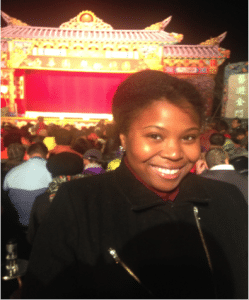
Taiwanese culture is exactly opposite that of Western culture, namely in the ways that students are taught. I’ll share a story. One day, I was teaching my 3rd graders how to write the letter “W”. And, abruptly, my co-teacher stops me and exclaims that I’ve written my “W” wrong. Baffled and dumfounded, I stare at my “W” for all of five seconds, trying to see where I’ve made a mistake. Turns out, the middle of my “W” had not touched the 3rd dotted line. I was a bit frustrated and could not understand why my co-teacher would point out such a tedious “mistake”, but I ignored it and kept moving. Fast forward to yesterday, I was writing “i” on the board. I wrote it in cursive and all of the students started to scold me, saying that I’d written it wrong because it curved at the bottom. Frustrated again, I decided to ask my co-teacher the way I was writing my letters was so important.
[bctt tweet=”My co-teacher told me that Taiwanese parents engrain the concepts of precision and attention to detail—particularly in writing characters (the writing system everyone uses)—to children at a very early age. “]
When one writes their characters, it has to be exact, and be written in a specific stroke order, the sequence in which one writes a character. This type of precision is also for clarification purposes. Some characters look alike, so if written wrong, one could be writing something they hadn’t intended to (like 钱money and 我me).
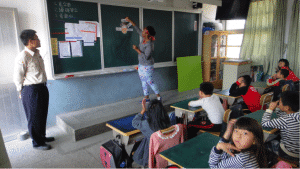 In other instances, even when making crafts, students make sure that they always use the right type of glue, rulers, scissors and tape to ensure a nice and pristine finished project. For awhile, this all baffled me, because I expected them to be like American kids, whisking away with joy to create anything and everything on a whim without much thought, but for my students, writing and craft-making are tasks to be taken seriously and require a great amount of detail and precision.
In other instances, even when making crafts, students make sure that they always use the right type of glue, rulers, scissors and tape to ensure a nice and pristine finished project. For awhile, this all baffled me, because I expected them to be like American kids, whisking away with joy to create anything and everything on a whim without much thought, but for my students, writing and craft-making are tasks to be taken seriously and require a great amount of detail and precision.
It then dawned on me that my students were not simply trying to critique the way I was writing my letters, or the way I cut construction paper, but that they were also applying their cultural norms of precision, and exactitude to something I was taking for granted. For them, as a teacher, I was stepping outside of a cultural norm, and they probably felt that I should be setting a better example. This by far has been the greatest cultural shift for me, and I’m not upset that it happened (although it can be very frustrating sometimes). I think as foreign teachers, we are obligated to be careful and aware of our classroom environment attitudes, cultural norms and more importantly, the examples we set for students. What we do in the classroom does not happen within a vacuum—something so small could send a big message. For me, I never want my students to think that their culture is not important. I also do not want them to think that as a teacher, I am incapable of doing something the right way or that they should not care about even the simplest of tasks, like writing the letter “W” or “i” correctly, because then, what does that teach them?
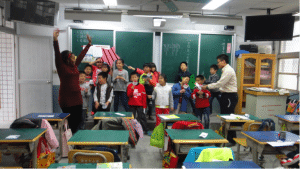
More pictures of JinNing Elemetary below:
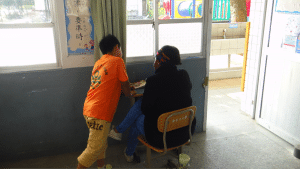
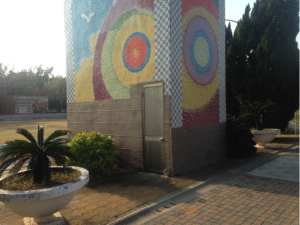
 [/fusion_builder_column][/fusion_builder_row][/fusion_builder_container]
[/fusion_builder_column][/fusion_builder_row][/fusion_builder_container]

